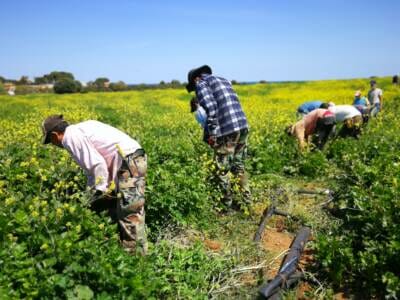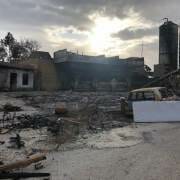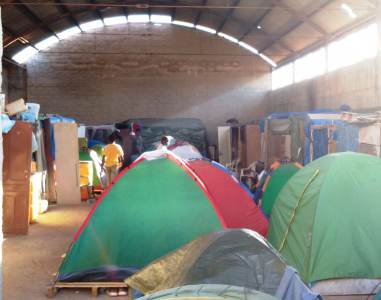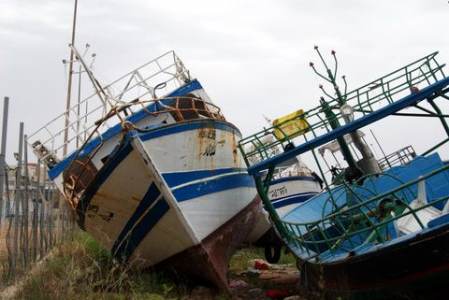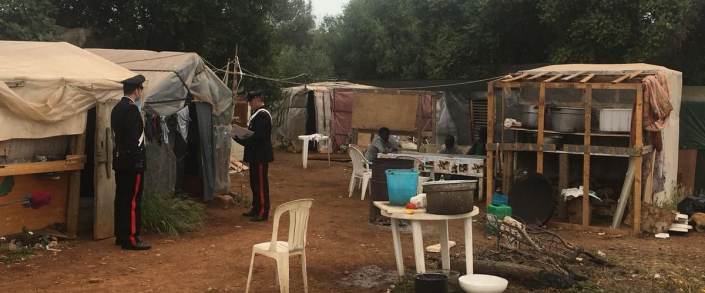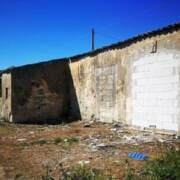Cassibile, the spectacle of exploitation
Article first published on May 7, 2021
The opening of the institutional camp in Cassibile has been narrated through the celebratory words of the institutions and the racist anger of the locals.
We spent many days in Cassibile (SR) – in the fields and in the streets of the town – and listened to migrant workers in order to draw attention to the labour exploitation that rages in the Sicilian lands.
Words around the camp
On Friday, April 30th, a month later than announced, the Cassibile institutional camp – also called by the press and politicians the ‘little houses’, the ‘village’, or the ‘hostel’ for migrants – finally began to welcome workers. Not all of them, of course, but only those who have a work contract, an identity document and a residence permit. Not all of them because, as we have already reported, the places are not even remotely sufficient to accommodate all the workers who arrived in Cassibile in these two months: they were supposed to be 120, already too few; they have become 68 (17 containers with four places each), to comply with the anti-pandemic regulations.
In order to understand what is at stake in Cassibile, we need to listen to the words that have been coming in thick and fast over the last month, and in particular over the last few days. Then we need to compare them with the facts, with the materiality of the daily lives of the people who work the land in eastern Sicily. The press has given prominence to the words of politicians and institutions, and to the anger of the people from Cassibile. We have observed this situation by staying in Cassibile for days on end and by listening to the voices of the workers.
The one day that will be remembered out of the whole sequence of events, and which has already made the rounds of the local and national press, is Thursday, April 29th, the date of the inauguration of the camp. The municipality and the Prefecture of Syracuse, as well as the Region, congratulated each other by describing the opening as “an example of anti-caporalism”, “a reality of integration”, “the residents of Cassibile and seasonal workers deserved this place”, during the inaugurational press conference, in the presence of the Head of the Department of Civil Liberties of the Ministry of the Interior, Michele Di Bari, the right-hand man of Minister of Interior Lamorgese, in charge of managing the reception of migrants arriving in Italy, which in fact means containing and repressing them.
The camp cost 242,000 euro and will be managed by the Passwork cooperative and the Red Cross, who were also present at the inauguration. Those who will live inside will not be able to cook independently, but meals will be served once a day. A shuttle service will also be provided to take the workers to the fields, but the contract with the company operating the service has not yet been signed. Authorities said at the inauguration that “This is how we defeat the illegality of the work”, but it is already late in the season and the organisations will only run the camp for two months, which is a limited perspective to say the least.
However, the high officials presented the camp as the solution to everyone’s problems: the workers and the inhabitants of Cassibile. Instead, in contrada Palazzo, where the camp is located, about fifty residents set up a protest march, parading with shirts and placards “#NoVillaggio”, “Less ghetto, more integration”, “More services for citizens”, while behind them stood a banner “Shame on you, shitty Italy”. The banner, at least initially, might have aroused some irony, given that at the head of the garrison there was a political exponent of the nationalist right and a representative of the ‘Giovani Cassibilesi’ committee, complete with mask and Italian flag, with the same political ideas. But there is no fun in listening to the angry words of the inhabitants, furious at the state that has never paved the roads in the district, where promises have been made for fifty years without being kept.
The distress is real, but politics, in any case, exploits it. And so, the smart local politicians have started to fan the flames of racist hatred, by using slogans such as ‘let’s solve the residents’ problems first’, ‘we don’t want them here’. The protest against the camp has become a pretext to lash out at migrant workers who have been the essential workers of a large part of the Sicilian agricultural sector for twenty years now. They took a real malaise – the abandonment of the suburbs and the South by the institutions – and transformed it with rhetorical pirouettes into a rally full of chauvinism and apology for the bosses, to the detriment of both workers in general and foreign workers.
This led to moments of high tension. While the police barred the entrance to the camp, preventing the protesters from spoiling the inauguration, a CGIL representative team arrived with a flag and was attacked by the crowd and then removed by the Digos present on the spot. The Work Unions therefore remained unrepresented at this inauguration.
Instead, tension and soon also fear (sadly we are quite sure) will set in.
The camp is indeed located at the end of contrada Palazzo: it can only be reached by crossing the main street of the district where the protesters live. The workers will therefore be forced to cross a hostile place several times a day. The first demonstration of how this structure can easily become a target came the night before the inauguration: the sewage pipes that connect the district and the camp to the rest of the city were sabotaged, causing sewage to spill near the place where the institutions were to march in a few hours.
The 24-hour surveillance of the structure, which was presented as a right of the workers, is in reality the result of growing tensions in the neighbourhood and the unfortunate placement of the camp. The result, which is already quite evident, is a situation where humanitarian intervention is mixed with surveillance practices bordering on detention, as it happens wherever emergency solutions to structural problems are adopted.
“Let’s give dignity to the workers,” the authorities say. And yet, it seems more and more that migrant workers are treated as docile bodies to be controlled every single moment of the day: from the bed to the camps, without however providing for sweeping checks on the contractual regulations where they will work. It is not surprising, then, that the workers have so far responded with mistrust to this approach, despite the totally dilapidated housing conditions they have had to deal with over the past month.
“We are having Ramadan, we want to be able to cook and eat together, and in the camp we can’t”, say some of the workers, who don’t want to be treated like children. “Is this a prison?”, they ask. They confront each other with lucidity and a pinch of bitterness for this opening for which they were neither asked, nor invited, often not even informed: “In Cassibile there are no laws for workers”. Some of them tried to approach the camp during the inauguration, not to celebrate but to register for the camp, but they were turned away by the police ‘for their own good’.
Exploited labour, inside or outside the camp
Behind the stage where institutions and leaders have paraded and the fake order of a ghetto village where both the rhetoric of security and legality as well as racist and xenophobic slogans find their place, there continue to be migrant workers who every day, for two months – in the midst of regional and national propaganda on the contrada Palazzo dormitory – allow the agricultural harvest season to go on.
Those migrants who harvest potatoes, fennel and carrots in the fields of eastern Sicily. Those migrants who every day at five o’clock in the morning – whether they come from the institutional camp, the rented houses or the caves where they take shelter – go to the main street of the town and are recruited and loaded onto the vans of the corporals, in invisibility, out of the eye of the spotlight.
Whether they are inside the maze of the humanitarian-detention system of the camp or in the informal interstices of self-organisation, the migrants face exploitative labour.
From the workers’ recounts we have learned that their work rhythms involve the daily loading of about 100 boxes of 20 kg each, with wages ranging between 30 and 40 euros per day for about 9/10 working hours. This is often done by paying fictitious wages for working hours that do not correspond to the truth, so the money received by the labourers is always less than the money owed.
It is the so-called grey labour – which is different from real informal work – that is rampant in the Syracuse area: a consolidated system among local companies, with few exceptions, which avoids working illegally and without a contract, but is nevertheless based on abuse and violation of rights.
Having a labour contract is not synonymous with regularity and a fair wage. So much so that the ‘regular’ labourers are further exploited with yet another cut in their pay: that is, the money owed to the corporals for the cost of transport services (from 3 to 7 euros), the money they deduct on piecework, for each box filled.
“Quick, quick!” the corporals say to the labourers filling boxes in the fields. If you don’t keep up the rhythm of exploitation, you are out: quick to work, quick to leave the informal camp that has been cleared, quick to run after a place to sleep in the village, quick to leave for another seasonal stage, quick to forget the violations that are being committed on your skin. Immediate obedience is demanded to the migrants, like beasts of burden.
The institutional field will not change these structural conditions. In this system that has been established for years, injustices related to labour exploitation will take place undisturbed, because there is no interest in changing it. On the contrary, the intention is to control and manage it.
Excluded or included in the camp, migrants continue to be the victims of a criminal system: because the “village” of Cassibile is not designed to fight the “caporalato”, but to discipline and control its exploited inhabitants, to order the labourers who transit through the town every year within a legitimate and normed institutional structure, to once again hide migrant humanity from the eyes of those who do not want to see it.
In this way, the camp will be anything but an “example of integration” and will not guarantee any legality: it will instead promote the marginalisation of migrants, who will be exploited by institutions and racist people, exploited by corporals and bosses, managed as labour to be disciplined, excluded from decision-making that affects them, deprived of dignity and protection.
Weak state with the strong
In less than a month it will be the anniversary of the death of Siddique Adnane, a 32-year-old Pakistani man killed last year in Caltanissetta with five stab wounds, after denouncing the bosses who exploited his fellow countrymen. He was not the first, nor will he be the last, to risk his life in the southern Italian countryside. And justice has not yet arrived for him.
Since Siddique’s death in Sicily, the situation has not changed at all: the labour exploitation of migrants continues to be a structural phenomenon, a criminal dysfunction of the production system that grows while the State, complicit, continues to leave foreigners in legal irregularity and undeclared work, feeding harassment and abuse by the strongest.
Instead of building walls and ghettos that exclude migrants, it would be enough to control the companies that benefit from the selection of labour carried out for them by the corporals, to stop profiting from criminalised migrants who do not have residence permits, and to penalise companies that evade contributions and support the corporals. We could then support short, ethical and sustainable supply chains, as it has already been proposed – with valid and concrete projects – by virtuous realities in the fight against the ‘caporalato’.
Instead, rhetoric and parades – which once again have excluded migrants – have ended up emerging in the media, silencing the only voices that are able to explain the seriousness of this normalised and accepted reality.
But out of the spotlight of the stage – in the outskirts of the Sicilian camps where slogans do not arrive – rights continue to rot like fruit in the sun.
In Cassibile and in Sicily, once again, the spectacle of a state has been staged that is weak with the strong and rages against the exploited.
Silvia Di Meo
Emilio Caja
Borderline Sicilia
Translated from Italian by Francesca Cavallo

